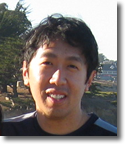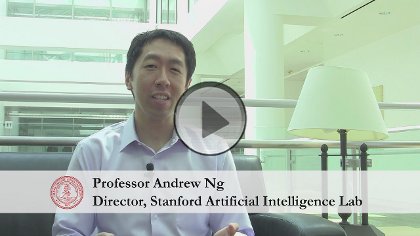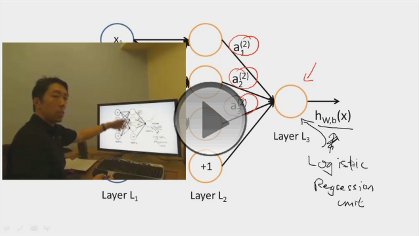
Sign Up
A bold experiment in distributed education, "Machine Learning" will be offered free and online to students worldwide during the fall of 2011. Students will have access to lecture videos, lecture notes, receive regular feedback on progress, and receive answers to questions. When you successfully complete the class, you will also receive a statement of accomplishment. Taught by Professor Andrew Ng, the curriculum draws from Stanford's popular Machine Learning course. A syllabus and more information is available here. Sign up below to receive additional information about participating in the online version when it becomes available.
Official registration will open later this summer. Your information will be kept private and used only to contact you once registration is available.
About The Class
What You Will Learn
The online class runs from October 10 through December 16, 2011. The curriculum draws from Stanford's popular introductory-level class on Machine Learning. During the class, the instructor will be available for online discussions.
A high speed internet connection is recommended as most of the course content will be video based.
About The Instructor

Professor Andrew Ng is Director of the Stanford Artificial Intelligence Lab, the main AI research organization at Stanford, with 20 professors and about 150 students/post docs. At Stanford, he teaches Machine Learning, which with a typical enrollment of 350 Stanford students, is among the most popular classes on campus. His research is primarily on machine learning, artificial intelligence, and robotics, and most universities doing robotics research now do so using a software platform (ROS) from his group.
In 2008, together with SCPD he started SEE (Stanford Engineering Everywhere), which was Stanford's first attempt at free, online distributed education. Since then, over 200,000 people have viewed his machine learning lectures on YouTube, and over 1,000,000 people have viewed his and other SEE classes' videos.
Ng is the author or co-author of over 100 published papers in machine learning, and his work in learning, robotics and computer vision has been featured in a series of press releases and reviews. In 2008, Ng was featured in Technology Review's TR35, a list of "35 remarkable innovators under the age of 35". In 2009, Ng also received the IJCAI Computers and Thought award, one of the highest honors in AI.
What Is Machine Learning?
Machine learning is the science of getting computers to act without being explicitly programmed. In the past decade, machine learning has given us self-driving cars, practical speech recognition, effective web search, and a vastly improved understanding of the human genome. Machine learning is so pervasive today that you probably use it dozens of times a day without knowing it. Many researchers also think it is the best way to make progress towards human-level AI. In this class, you will learn about the most effective machine learning techniques, and gain practice implementing them and getting them to work for yourself. More importantly, you'll learn about not only the theoretical underpinnings of learning, but also gain the practical know-how needed to quickly and powerfully apply these techniques to new problems. Finally, you'll learn about some of Silicon Valley's best practices in innovation as it pertains to machine learning and AI.
Course Description
This course provides a broad introduction to machine learning, datamining, and statistical pattern recognition. Topics include: (i) Supervised learning (parametric/non-parametric algorithms, support vector machines, kernels, neural networks). (ii) Unsupervised learning (clustering, dimensionality reduction, recommender systems, deep learning). (iii) Best practices in machine learning (bias/variance theory; innovation process in machine learning and AI). (iv) Reinforcement learning. The course will also draw from numerous case studies and applications, so that you'll also learn how to apply learning algorithms to building smart robots (perception, control), text understanding (web search, anti-spam), computer vision, medical informatics, audio, database mining, and other areas.
Frequently Asked Questions
- 1. What are the dates of the class?
- The class will start October 10, and end on December 16.
- 2. What are the pre-requisites for the class?
- You should be able to program in at least one programming language and have a computer (Windows, Mac or Linux) with internet access.
- 3. What textbook should I buy?
- There is no need to buy anything. We will provide detailed lecture notes of all the technical content, which will be yours to keep and use as a reference after the end of class.
- 4. Will students receive a Stanford certificate or grade for completing the course?
- No. You will receive a statement of accomplishment from the instructor, which will include information on how well you did and how your performance compared to other online students. Only students admitted to Stanford and enrolled in the regular course can receive credit or a grade, so this is not a Stanford certificate.
- 5. Will the text of the lectures be available?
- The instructors hope to transcribe the lectures into text to make them more accessible for those not fluent in English. Stay tuned.
- 6. Can online students ask questions and/or contact the professors?
- Yes, but not directly. Students can submit questions that will be aggregated. Top-ranked questions will be answered by the professor and the teaching staff.
- 7. How difficult is the class?
- This class is designed so that everyone should be able to complete it successfully (so long as you meet the minimal prerequsites). The goal isn't to have some of you understand 90% of the material, and others understand 70%. Using our new learning platform, it should be possible for everyone to understand 100% of the core material.
- 8. Will other Stanford resources be available to online students?
- No.
- 9. What non-Stanford resources are available?
- A study group has formed at reddit.
- 10. Will other free online classes in computer science be offered this fall?
- Yes. Stanford will also offer Introduction to Databases taught by Professor Jennifer Widom, and Introduction to Artificial Intelligence taught by Professor Sebastian Thrun and Dr. Peter Norvig.



